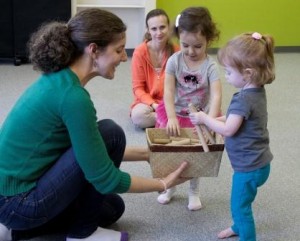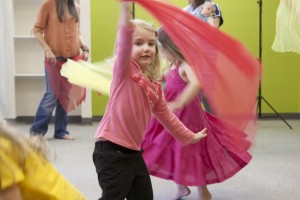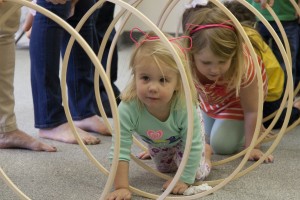Finger plays are songs or stories that are acted out using your fingers and hands. As parents and teachers, we all want children to experience and play with as many finger plays in their early years because they “focus on the aspect of identification of fingers and hands and experimentation with their various movements.” In Musikgarten classes, finger plays are an essential and fun part of every toddler music class.
Over the years of teaching toddler music class I have learned that I must be well versed in the finger play to be able to share it with a group of children. As I present the activity I realize I am also presenting it to parents in the hope they will continue to play and share this play at home.
So where do we begin?
Like many finger plays, the raw material for a parent or teacher is usually a ‘head scratching’ little poem:
Five little birds without any home,
Five little trees in a row,
Come build your nests in our branches tall,
We’ll rock you to and fro.
Not much to go on…….
A parent started a discussion about finger plays in class the other day. She asked, “How do I do finger plays? Is there an online source to show me how? When can I do them at home?” I realized that finger plays were not a part of her early life. As a child I was surrounded by finger plays, learning and enjoying them with my parents, my siblings, my Sunday school teacher, etc. Finger plays were part of my everyday world as a child. Is it possible we have lost the art of finger play in today’s home life?
As a teacher a finger play is an immensely powerful tool to draw in my children and their parents to a close knit circle. From this intimate space we will share a moment that brings smiles and giggles mixed with hugs and rocking. Always a good plan in a toddler music class!
The experts say a finger play:
- develops vocabulary
- creates a stronger emotional link between parent/teacher and child
- develops the motor facility of the hand
- develops cognitive areas of the brain
- creates a safe place for children and adults to explore together
- creates a safe place for physical contact between a parent/child or teacher/child
- connects culture from generation to generation
- goes beyond the purpose of nurturing, caressing, comforting or feeding.
- creates laughter and excitement and pleasure.
- creates a place where a child wants to repeat the game and play more and more.
- turns a hand into a toy.
The finger play, summarizes Jelena Sitar Cvetko, is the “shortest and simultaneously the most comprehensive form of Folk literature. Finger plays are pre-dramatic forms with fingers as players and the hand as the stage, completed within itself and created within the play itself.” **
Good stuff in a little activity. But still, the question still begs, HOW do I do a finger play?
So I have created a “before children walk into the room” video of the finger play “Five Little Birds”.
With no children in the room, it appears that all you need are the words and the fingers. Notice the pace of the poem, the vocal tone used and the expressive quality of my fingers. I believe a finger play needs to be rehearsed before your families walk in because when children are added to the mix, anything can happen. You need to be ready to adapt in the moment.
Here is a video of another finger play with children and parents learning side by side. It is quite different in that you need to engage the toddlers and the parents. Luckily it helps that you are building on the common bond of love between parent and child:
When can a parent/grandparent/caretaker use a finger play?
- during a diaper change
- before bed
- during a waiting time in a doctor’s office
- during play time
- whenever you need a connection or just want to laugh and giggle along with a child
Finger plays are fun and can create special moments throughout a child’s day. For the teacher, it can make a major fun moment in a music class. For the parent, it is a break from the necessary routines of a child’s life. Yet both parents and teachers still express apprehension when it is time to actually share the finger play.
Here are some clues to help:
- Memorize the finger play but don’t worry if you mess up a word or two. It is more about the tone of voice, the pacing and loving way you transmit the play.
- Repeat over and over. Children love to repeat and will gladly help and correct you if you don’t repeat it exactly the same way you did it yesterday. Believe me, they remember EVERYTHING!
- Exaggerate the underlying emotion of the finger play. Emotional response (laughing, crying, gasping) create significant memory cues for the children.
Watch how I emote in “Five Freckled Frogs” as the frogs “disappear into the pond” only to all return at the end.
Finally, some finger plays, like “Whoops! Johnny” can be changed to include the child’s name. I add verses which include each of the children and then Mom, Dad, Grandma, Grandpa, sisters, brothers, and pets. I had a mother say her child would go through everybody in her world before going to bed at night. The list was quite long and she would diligently repeat all the loving people in her repeats. And, yes, I was included!
I hope you will make finger plays a part of your repertoire as a teacher and as a parent/grandparent/caretaker. Use these whenever possible. This magical moment will make a difference in your life as well as the child playing with you.
What could be better?
**Quote from the Paper of Jelena Sitar Cvetco, The value of Finger play as a form of Cultural Heritage in the Curriculum of the First Age Period: https://hrcak.srce.hr/file/222654













 nd promote a few classes “al fresco” – have parents meet you at a local park or under a shady tree near your studio (of course, get permission if it’s not your property.) Ask families to bring picnic blankets or beach towels, and water bottles. Encourage children to listen to the music of nature, like birds singing and leaves blowing in the breeze. You can even have an impromptu summer parade!
nd promote a few classes “al fresco” – have parents meet you at a local park or under a shady tree near your studio (of course, get permission if it’s not your property.) Ask families to bring picnic blankets or beach towels, and water bottles. Encourage children to listen to the music of nature, like birds singing and leaves blowing in the breeze. You can even have an impromptu summer parade!